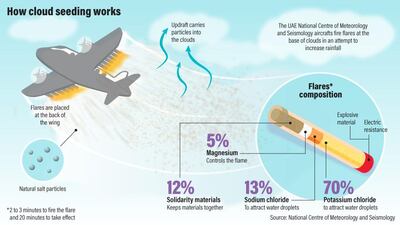Rain enhancement will play a major role in reducing the impact of droughts and rising temperatures, as the world grapples with water shortages, a UAE minister has said.
Abdullah Al Nuaimi, Minister of Climate Change and Environment, warned that by 2050 at least 40 per cent of the world’s population is projected to live under severe water stress, including almost the entire population of the Middle East.
Speaking at the International Rain Enhancement Forum in Abu Dhabi on Monday, Mr Al Nuaimi said climate change would exacerbate the situation but research into cloud seeding was crucial in tackling the issue.
“Climate change will not only make the situation worse in currently water-stressed regions, but also generate water stress even in some of those regions that have sufficient water resources today,” he said.
Addressing water security is a priority for the UAE, said the minister. He said this was part of the country's commitments under the 2015 Paris agreement.
The UAE also aims by 2036 to reduce consumption of drinkable water by 20 per cent and increase reuse of treated water to 95 per cent.

Authorities have also been running initiatives to reduce water loss and consumption such as the introduction of green building standards, retrofit initiatives, water tariff reforms and public awareness campaigns to encourage responsible water use.
The forum is being held online this year because of the Covid-19 pandemic. The two-day event brings together leading experts, researchers and scientists to tackle pressing water security issues worldwide along with scientific advancements in cloud seeding.
In remarks delivered on his behalf by Abdulla Al Mandous, director of the National Centre of Meteorology, Sheikh Mansour bin Zayed, Deputy Prime Minister and Minister of Presidential Affairs, said water security was an urgent global issue and the UAE would play its part.
"This situation requires concerted national, regional and international action to promote research and development and attract investment in new technologies as well as establishing effective partnerships," said Sheikh Mansour.
Organisers also launched the fourth iteration of a $1.5 million grant programme at the forum. The prize is awarded to pioneering researches in the field and those interested can submit their pre-proposals before March 18. It was also announced on Sunday that the forum will now run every two years. It will next beheld in 2023.
The UAE’s seeding programme began in the 1990s and is run by the NCM. Hundreds of missions are conducted every year.
Cloud seeding essentially tries to wring more water out of a rainy cloud. Salt, which naturally attracts water, is attached to flares that are then fired into clouds in the hops of inducing more rain.
In an arid country with less than 100mm of a rain a year, it is not hard to see why seeding is a tempting proposition.
Seeding experts at the NCM have speculated that it can boost rainfall by as much as 30 to 35 per cent in a clean atmosphere, and by up to 10 to 15 per cent in a dusty one.
But research is pouring into the field to understand more about its success rate, with advancements in the science discussed in Abu Dhabi over the next two days.










